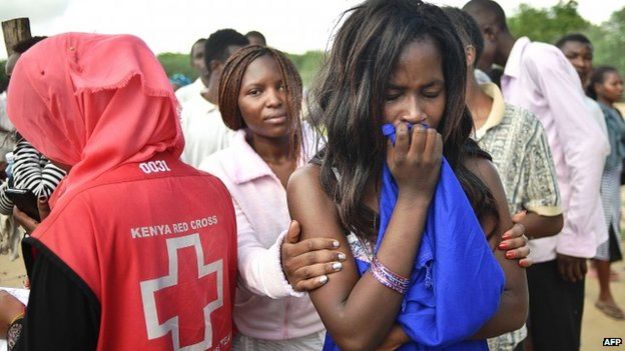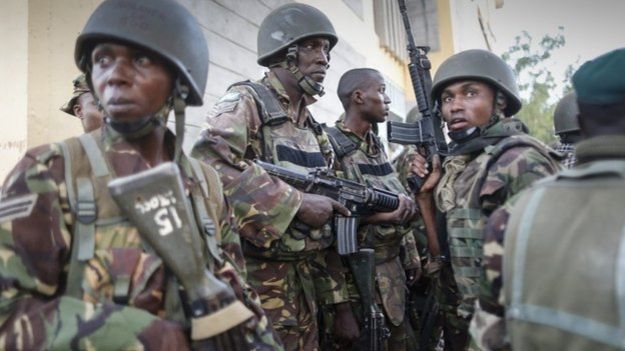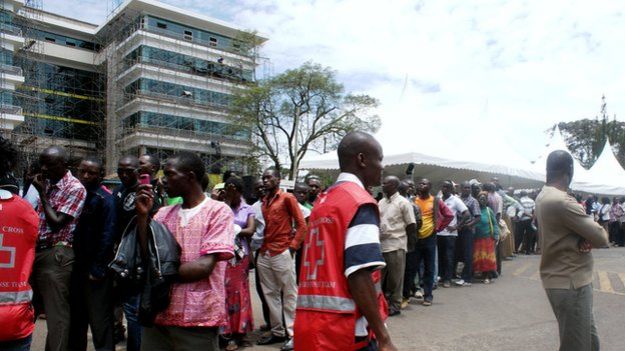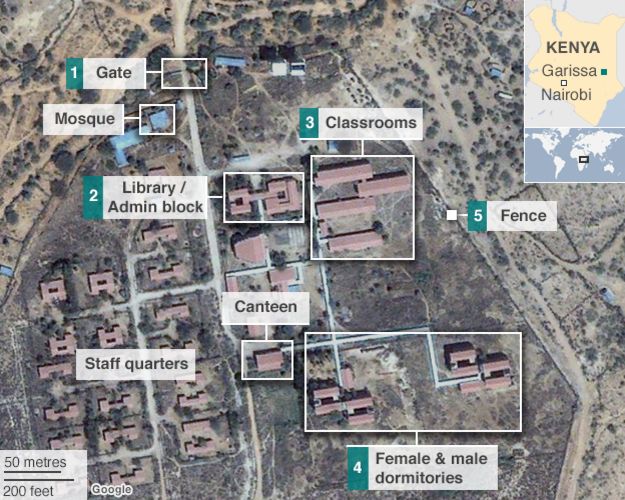Kenya is mourning 148 people killed in Thursday's al-Shabab attack on Garissa university campus, amid questions over why warnings were ignored.
Kenyan newspapers say there was intelligence information of an imminent attack on a school or university.
Locals question why security was not heightened, with only two guards on duty at the time of the attack.
Four more people have been found alive on the campus, but two are suspects and have been arrested, sources say.
One is said to be a Tanzanian national with no known links to the university.
Kenya's interior minister declared the recovery operation over.
Joseph Nkaiserry identified the victims as 142 students, three police officers and three soldiers.
"We have called off the operation after combing the whole university, all the bodies have been removed from the scene and brought to Nairobi," he said after arriving back in the capital.
Police in neighbouring Uganda say they have received information suggesting a similar attack is being planned there.
Attack warning
Security services appear to have had some information that an attack on an institution of higher learning was in the offing and appear to have warned institutions to be careful, the Daily Nation newspaper reports.
It says the university of Nairobi warned its students on 25 March that it had received intelligence information about a possible attack on a university and asked them to be vigilant.

Locals in Garissa, a city about 150km from the Somali border, also question why security was not boosted in light of the intelligence.
"It's because of laxity by the government that these things are happening. For something like this to happen when there are those rumours is unacceptable," said Mohamed Salat, 47, a Somali Kenyan businessman.
One of the survivors, who hid in bushes as the gunmen assaulted the campus killing 147 people, said the students had raised security issues late last year, but only two armed guards had been provided.
Another survivor, Helen Titus, told the news agency AP that one of the first things the gunmen did when they assaulted the campus was head for the lecture hall, where Christian students were gathered for morning prayer.
"They investigated our area. They knew everything," the 21-year-old said.
A dusk to dawn curfew has now been imposed in Garissa and three nearby counties.

In his address to the nation after the attack, President Uhuru Kenyatta said he had instructed the police chief to speed up the training of 10,000 recruits, because Kenya had "suffered unnecessarily due to shortage of security personnel".
Al-Shabab was also blamed for the Westgate Mall massacre in Nairobi in 2013 in which 67 people died, also after guards at the entrance were overwhelmed and people were held hostage inside.
The bodies of those killed in Garissa have been flown to the capital Nairobi for identification, as the local mortuaries have been unable to cope, and many of the students killed came from other parts of the country.
The BBC's Anne Soy saw ambulances leaving the Garissa campus on Friday and hundreds of survivors being sent home.

Christians targeted
The masked attackers rampaged through the campus at dawn on Thursday, shooting and shouting "we are al-Shabab".

At the scene: Wanyama wa Chebusiri, BBC Africa, Garissa:

A second-year student who hid for 10 hours in a wardrobe is one of about 500 survivors still being held at a military facility, where they are undergoing counselling.
Her father drove for four hours from Nairobi when he was unable to get hold of her during the siege. He told the BBC about his desperate search for his daughter at the mortuary, hospital and military airstrip. Late in the afternoon, when he had almost given up hope, he got a text: "Dad call me". They have yet to be reunited but his relief is palpable.
Questions are being asked about the university's security. One survivor, who hid in bushes for five hours, told the BBC that students had raised the issue at the end of last year, but only two armed guards had been provided. One of the few students from the local community, he said he would never set foot on the campus again.

The heavily armed gunmen killed the two security guards first, then fired indiscriminately at students, many of whom were still asleep in their dormitories. They singled out Christians and shot them, witnesses said.
While many of the survivors speak to the media, little is known so far about those who were killed.
The BBC's Frenny Jowi says Kenyan media are cautious in their coverage because of a new anti-terror law that stipulates heavy fines for material "likely to cause fear".

Garissa university campus

1. Militants enter the university grounds, two guards are shot dead
2. Shooting begins within the campus
3. Students attacked in their classrooms while preparing for exams
4. Gunmen believed isolated in the female dormitories
5. Some students make an escape through the fence

The gunmen were eventually cornered in a dormitory by Kenyan security forces. Four of them died when their suicide vests detonated. A fifth gunman was reportedly arrested.
More than 500 students managed to escape.
Al-Shabab, which is linked to al-Qaeda, said it carried out the attack. The group says it is at war with Kenya, which sent troops to Somalia in 2011 to fight the militants.
The Kenyan government has offered a reward of $53,000 (£36,000) for the man it says planned the killing - Mohamed Kuno, a former Kenyan schoolteacher, now thought to be in Somalia.

0 comments:
Post a Comment